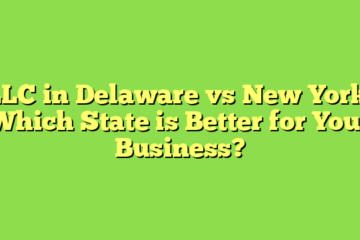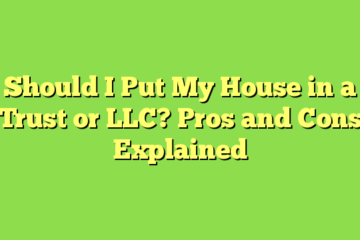As a business owner or individual dealing with a Limited Liability Company (LLC), you may find yourself in a situation where legal action becomes necessary.
Disputes can arise from various circumstances, such as breach of contract, negligence, or even fraud. In such cases, you may be wondering if you can sue an LLC and, if so, what steps you need to take.
Understanding the Nature of an LLC
Before delving into the specifics of suing an LLC, it’s essential to understand what an LLC is and how it differs from other business entities. An LLC is a legal structure that provides limited liability protection to its owners, known as members. This means that, generally, the personal assets of the members are shielded from the debts and liabilities of the company.
However, this liability protection is not absolute, and there are certain circumstances where individual members can be held personally liable. It’s crucial to understand these exceptions to ensure that you pursue the appropriate course of action.
Grounds for Suing an LLC
There are several common scenarios in which an individual or another business may have grounds to sue an LLC. These include:
Breach of Contract
If an LLC fails to fulfill its contractual obligations, such as failing to deliver goods or services as agreed upon, you may have grounds for a lawsuit. It’s important to have a valid and enforceable contract in place to support your claim.
Negligence
If the actions or omissions of an LLC result in harm due to negligence, such as slip and fall accidents on their premises or faulty products causing injuries, individuals may be able to sue for damages.
Fraud or Misrepresentation
If an LLC engages in fraudulent activities or misrepresents information that leads to harm or financial loss, individuals may have grounds for a lawsuit.
Personal Injury or Property Damage
In cases where an LLC’s actions or negligence directly cause personal injury or property damage, individuals may be able to hold the LLC accountable through legal action.
Piercing the Corporate Veil
While the liability protection afforded by an LLC is significant, there are circumstances where courts may “pierce the corporate veil” and hold individual members personally liable for the actions or debts of the company. This can occur when members engage in fraudulent or illegal activities, commingle personal and business assets, or fail to maintain proper corporate formalities.
Courts typically consider factors such as misuse of company funds, inadequate capitalization, and the involvement of fraud when determining whether to pierce the corporate veil. It’s important to note that this is a complex legal process, and the specific criteria can vary depending on the jurisdiction.
Steps to File a Lawsuit Against an LLC
If you decide to pursue legal action against an LLC, there are several steps you need to take:
Step 1: Gather Evidence
Collect all relevant evidence to support your claim, such as contracts, correspondence, invoices, receipts, and any other documentation that demonstrates the harm caused by the LLC.
Step 2: Determine the Appropriate Court
identify the court where you will file the lawsuit, considering factors such as the location of the LLC and the amount of damages you are seeking.
Step 3 Draft and File the Complaint
Prepare a formal complaint outlining your claims and legal arguments, and file it with the appropriate court.
Step 4: Serve the LLC
Properly serve the LLC with copies of the complaint and summons, following the legal requirements in your jurisdiction.
Step 5: Engage in Alternative Dispute Resolution (if applicable)
Depending on the circumstances, you may need to explore alternative dispute resolution methods, such as mediation or arbitration, before proceeding with a full-blown trial.
Step 6: Proceed with the Lawsuit
If the case is not resolved through alternative dispute resolution, you will need to follow the court’s procedures and comply with all deadlines throughout the litigation process.
Consulting with a Legal Professional
Suing an LLC can be a complex and nuanced legal process, with various factors to consider. Consulting with an experienced business attorney is highly recommended to ensure that you understand your rights, evaluate the strength of your case, and navigate the legal system effectively.
A legal professional can provide valuable guidance on the most appropriate course of action, whether that involves pursuing alternative dispute resolution methods, negotiating a settlement, or proceeding with a lawsuit. They can also assess the potential for piercing the corporate veil and holding individual members personally liable, based on the specific circumstances of your case.
Conclusion
While the liability protection offered by an LLC is a significant advantage for business owners, it does not provide a blanket shield against all legal actions.
Individuals and businesses may have grounds to sue an LLC in cases of breach of contract, negligence, fraud, or personal injury/property damage. However, the process of suing an LLC can be complex, and it’s essential to consult with a legal professional to understand your rights and options.
Remember, the decision to pursue legal action against an LLC should be carefully considered, weighing factors such as the strength of your case, potential damages, and the likelihood of success. By following the proper legal procedures and seeking professional advice, you can increase your chances of achieving a favorable outcome and protecting your interests.

Alfie Wilson, Esq., is a legal content writer with expertise in business formation, criminal law, veterans disability, family law, DUI law, personal injury, animal welfare, and legal writing. He holds a J.D. from Emory University School of Law and has experience in appellate advocacy and regulatory matters. Alfie’s passion lies in breaking down complex legal topics for a non-lawyer audience. He currently writes for law firms and non-profits on various issues and resides in Arlington, Virginia.








